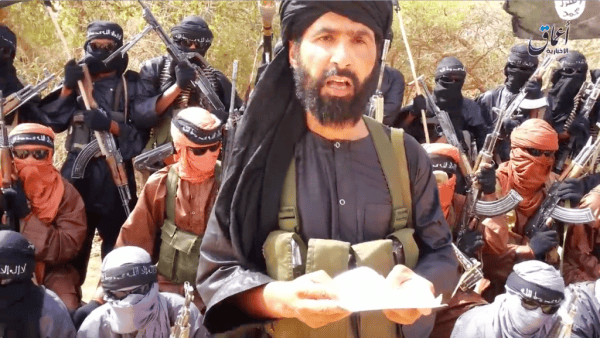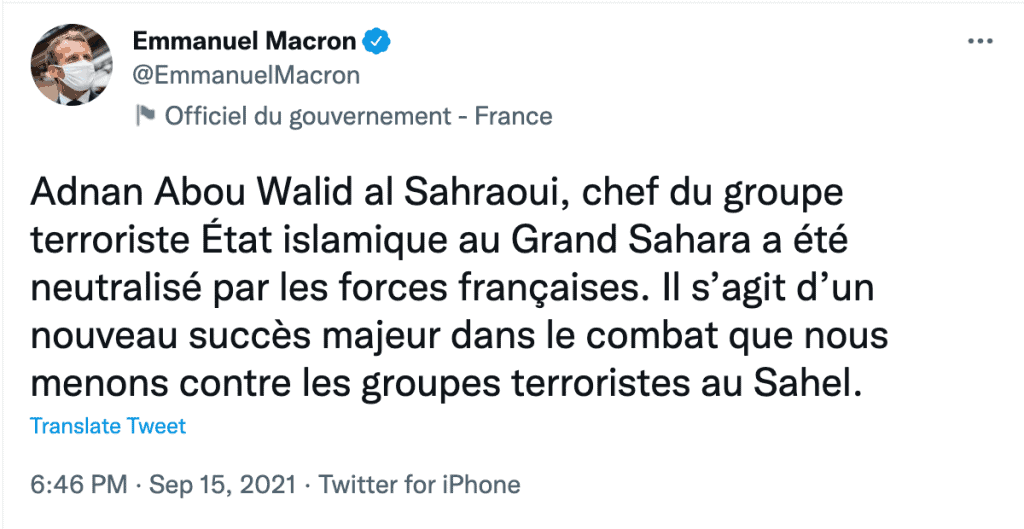
French President Emmanuel Macron announced yesterday that Abu Walid al Sahrawi, the leader of the Islamic State in the Greater Sahara, was killed in a drone strike in August.
Al Sahrawi’s men are prolific insurgents and terrorists. The jihadists under his command launched a series of attacks against African, French and U.S. forces since the group’s formation in 2015.
In Oct. 2017, Al Sahrawi’s fighters ambushed a U.S.-Nigerien patrol outside of Tongo Tongo, Niger. Four U.S. soldiers were killed in the attack. The U.S. government offered a reward of up to $5 million for information on al Sahrawi’s whereabouts as a result.
Al Sahrawi became a key figure in the global rivalry between the Islamic State and al Qaeda.
He first swore bayah (an oath of allegiance) to the so-called caliphate in May 2015. However, the Islamic State did not publicly recognize it until Oct. 2016, when the group’s Amaq News Agency released a short statement acknowledging Sahrawi’s oath, as well as a video of him reading his pledge.
Sahrawi previously served as the spokesman for the Movement for Oneness and Jihad in West Africa (MUJAO), an al-Qaeda-linked group. In that role, Sahrawi was allied with Mokhtar Belmokhtar, who was originally a commander in al Qaeda in the Islamic Maghreb (AQIM). Disagreements with AQIM’s leadership led Belmokhtar to establish his own force in 2012. MUJAO merged with Belmokhtar and his men in 2013 to form Al Murabitoon. But Sahrawi and a cadre of fighters broke away to establish a branch of the Islamic State in Mali just two years later.

When Sahrawi first announced his oath of loyalty to Abu Bakr al Baghdadi, he claimed to do so on behalf of the entire Al Murabitoon group.
However, only some of Al Murabitoon’s fighters joined Sahrawi in defecting to the Islamic State. Jihadists quickly released a statement in Belmokhtar’s name, saying that Al Murabitoon remained in al Qaeda’s camp. Local media reported clashes between Sahrawi’s men and fighters loyal to Belmokhtar in the weeks that followed.
In Aug. 2015, Al Murabitoon’s shura council elected Belmokhtar as the group’s new leader. But after the challenge from Sahrawi and the Islamic State, Belmokhtar’s men reunited with AQIM in late 2015.
Belmokhtar has been reportedly killed on several occasions and his status was murky throughout all of the infighting discussed above. To this day, it is not clear what exactly happened to Belmokhtar.
Regardless, Sahrawi’s group survived the clashes with the al Qaeda loyalists and remained a potent force in the years that followed. The Islamic State’s regional arm operates in Mali, Niger, Burkina Faso and elsewhere.
Macron’s announcement comes at a time when France’s campaign in West Africa has come under increased public scrutiny. Both al Qaeda and the Islamic State are waging jihad in the region for the purpose of building an Islamic Emirate.
AQIM and allied groups took over much of Mali in 2012, forming a nascent emirate. France then launched Operation Serval, a military campaign aimed at dislodging the jihadists’ proto-emirate, in January 2013. Operation Serval evolved in to Operation Barkhane in mid-2014. French soldiers have continued hunting al Qaeda and Islamic State figures, while also providing support to other local forces, ever since.
France has successfully targeted other senior terrorists throughout its mission. For instance, the longtime leader of AQIM, Abdelmalek Droukdel (a.k.a. Abu Musab Abdel Wadoud), was killed in a June 2020 counterterrorism raid in Mali. The U.S. provided logistical support to the French forces responsible for the operation. The French government described Droukdel as a member of al Qaeda’s “management committee” and as a top deputy to Ayman al Zawahiri after he was killed. Zawahiri, the global head of al Qaeda, finally eulogized Droukdel during a video released on Sept. 11 of this year. Files recovered in Osama bin Laden’s compound show that Zawahiri was largely responsible for managing the relationship between AQIM and al Qaeda’s senior leadership during Droukdel’s tenure.







